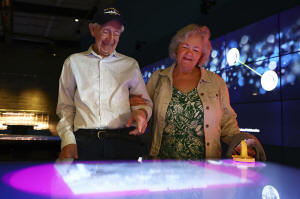Memory cafes at the National Comedy Center ignite laughter and
connection for dementia patients
[July 21, 2025]
By CAROLYN THOMPSON
JAMESTOWN, N.Y. (AP) — Side by side on a sofa inside the National Comedy
Center, Gail and Mario Cirasunda chuckled at a clip from the 1980s
sitcom “Family Ties” that was playing on a TV screen. The show’s oldest
daughter, Mallory, was introducing her unconventional artist boyfriend
Nick to her bewildered television family.
“I think our daughter brought him home once. Maybe two of our
daughters!” Gail said with a laugh over coffee and donuts later.
“Five daughters, two sons,” her husband Mario, 85, chimed in. “Sometimes
I’d wonder,” he smiled, shaking his head at the memories of the couple's
own family antics over their 59-year marriage.
Moments like this are what brought the Cirasundas to the comedy museum
in western New York and the memory cafe taking place inside. The monthly
events invite people with Alzheimer’s, dementia, or other memory loss,
and their caregivers, to spend time at the interactive museum. For
visitors like Mario, who has dementia, and his wife, the scenes and
artifacts from funny shows and comedians have a way of triggering shared
laughs and connection, and, as comedy center staff have found, memories.
Gail, 78, treasures the moments when Mario — who still vividly recalls
his childhood route to school and the names of old friends — also
recollects experiences from their shared life. A 1965 blind date after
Mario got out of the Navy led to seven children, 24 grandchildren, eight
great-grandchildren, careers and moves. However, memories made over a
lifetime together have become increasingly elusive over the past several
years, since about the time Mario started to get lost driving and forget
whether he likes a particular food.

At a recent memory cafe, the Cirasundas, from suburban Buffalo, and
others spent the morning walking through the museum that was inspired by
“I Love Lucy” star Lucille Ball in her hometown of Jamestown.
Gail kept a guiding hand on her husband's elbow as they smiled through
Johnny Carson bits from “The Tonight Show” in the center's late night
studio, browsed standup comic George Carlin's personal notes and
comedian Bob Hope artifacts, and laughed out loud at a display of
classic comedy props like the banana peel and pie in the face.
During a break in the museum's restaurant, the “Family Ties” video
evoked scenes from real life.
“The moments are precious because he might not remember it,” Gail
explained, “but when you’re there talking about it, you’re remembering.
Five minutes later, it’s gone — but you had that moment.”
The Alzheimer’s Association estimates 7.2 million Americans over the age
of 65 are living with Alzheimer’s dementia, and an even higher number of
people care for an impacted friend or family member.
[to top of second column]
|

Mario and Gail Cirasunda, of Orchard Park, N.Y., interact with one
of the museum's touch screen exhibits during a Memory Cafe event at
the National Comedy Center Monday, May 5, 2025, in Jamestown, N.Y.
(AP Photo/Jeffrey T. Barnes)
 Memory cafes have emerged around the
world in recent years as a way to connect and support individuals
and caregivers, and provide information and resources. Many of the
more than 600 cafes regularly running in the U.S. — often meeting in
libraries and community centers — bring in speakers and engage
participants with physical activity, music and art, all of which are
good for the brain, experts say.
The National Comedy Center held its first one
earlier this year. It seemed a natural fit after staff heard from
patrons about the museum's impact on their loved ones.
Spokesman Gary Hahn sees the center as a kind of time machine, with
exhibits memorializing comedy from Vaudeville to viral memes that
can transport visitors back, no matter their age. Even before the
formal memory cafes began, a visitor told the center's staff that
his wife with dementia seldom spoke — but would become more verbal
while walking through the museum and laughing alongside him.
“There was a stimulation of the part of the brain, whether it’s
because of the nostalgia or the comedy, that had an impact on her,”
said Journey Gunderson, the center's executive director.
Shelia Kennison, an author and psychology professor at Oklahoma
State University, said humor positively affects physiology in many
ways.
“It takes most of your brain to process what’s being said or being
shown to you and then to find the humor, and then once that happens,
it sets off this cascade of brain activity and physiological changes
that affects the whole body," said Kennison, who studies how humor
is involved in cognition, memory and overall wellbeing. "So it
really is a whole brain workout and a whole body workout when you
get that really funny joke that makes you laugh and slap your knee
and rock back and forth.”
Laughter has always been important to Gail and Mario Cirasunda,
whose children often gave their father Peter Sellers' “Pink Panther”
movies as gifts so they could see him laugh.
“Keep a sense of humor in your marriage,” Gail's boss told her
before she got married. Even through the challenges, she said, she's
followed the advice.
All contents © copyright 2025 Associated Press. All rights reserved |